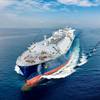Coast Guard Detains Vessel in Portland
The Coast Guard has since Sunday taken action in three unrelated marine safety cases, which has protected the environment, protected mariners and protected the maritime transportation system in the port of Portland, Oregon.
Sector Columbia River’s recent activity began around 11 a.m. Sunday with notification from the 648-foot car carrier Morning Spruce of the vessel’s loss of engine power while 12 miles southwest of the Columbia River bar, leaving the vessel adrift in 12-foot seas. The Coast Guard Captain of the Port issued an order directing the owner of the Morning Spruce to immediately contract for tow vessels to hold the ship offshore. In addition to its cargo, the Morning Spruce was reportedly carrying a combined 543,000 gallons of heavy oil, diesel and lube oil.
Engine power was restored around 3:30 p.m. Sunday, and the Coast Guard monitored the progress of the vessel, escorted by the tug Kokua, as it cleared the Columbia River bar. The Kokua and Morning Spruce were joined by another tug, the Vancouver, for the transit to Portland, Ore. The Coast Guard then made preparations for an inspection of the Morning Spruce as it arrived in Portland.
Coast Guard Marine Safety Unit Portland’s Port State Control Branch conducted an inspection of the Morning Spruce Tuesday, revealing numerous safety hazards, resulting in the detention of the vessel. The safety hazards included excessive oil in machinery spaces, inadequate patches made on the vessel’s fire-main piping, heavy hydraulic oil leaks, and inadequate fire control boundaries. The control action will remain in effect until the violations are corrected and verified through follow up inspections.
Meanwhile, a Coast Guard Vessel Boarding and Safety Team from Sector Columbia River boarded the 738-foot freighter Laconia Tuesday, as part of a port state control boarding. Alerted by Customs and Border Protection agents already aboard, the Coast Guard team conducted alcohol tests of the master of the ship, suspecting the captain was intoxicated, based upon CBP agents’ observations and their discovery of open containers of alcohol found within the captain’s stateroom.
As a result of the breathalyzer test, the Coast Guard boarding team removed the master and transferred him to the custody of Coast Guard Investigative Service agents. The Coast Guard then required the owner of the Laconia to acquire a replacement for the ship’s captain prior to the freighter’s departure from its anchorage.
The Coast Guard Captain of the Port Columbia River issued bar closures Wednesday for Depoe Bay and the Siuslaw River, due to dangerous high surf and offshore weather conditions. The closure protects mariners and the maritime transportation system by reducing the risks associated with bar crossings made under severe conditions.
“Together, the actions taken by Sector Columbia River demonstrate how the Coast Guard preserves the maritime business commons by reducing the risk and uncertainty of the maritime environment and how the Coast Guard’s vigilant maritime safety enables American prosperity,” said Commander. Chris O’Neil, chief of media relations for the Coast Guard.
According to the Port of Portland, more than 550 oceangoing vessels called upon facilities in the port of Portland in 2011, carrying to and from the port more than 13.1 million short tons of cargo, including more than 941,000 short tons of break-bulk cargo, 197,000 containers, 4.7 million short tons of grain, 234,000 autos and 5.2 million short tons of bulk mineral cargo.










